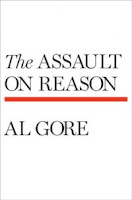Book Excerpt: The Assault on Reason
While America slept a Presidency was stolen, The world was given a loser, instead of a leader of the Free World

 No, he hasn't given up his global warming crusade, but he has returned to the fundamental ailments that face America -- particularly in regards to our current rogue government.
No, he hasn't given up his global warming crusade, but he has returned to the fundamental ailments that face America -- particularly in regards to our current rogue government.By Al Gore
Not long before our nation launched the invasion of Iraq, our longest-serving Senator, Robert Byrd of West Virginia, stood on the Senate floor and said: "This chamber is, for the most part, silent—ominously, dreadfully silent. There is no debate, no discussion, no attempt to lay out for the nation the pros and cons of this particular war. There is nothing. We stand passively mute in the United States Senate."
Why was the Senate silent?
In describing the empty chamber the way he did, Byrd invited a specific version of the same general question millions of us have been asking: "Why do reason, logic and truth seem to play a sharply diminished role in the way America now makes important decisions?" The persistent and sustained reliance on falsehoods as the basis of policy, even in the face of massive and well-understood evidence to the contrary, seems to many Americans to have reached levels that were previously unimaginable.
A large and growing number of Americans are asking out loud: "What has happened to our country?" People are trying to figure out what has gone wrong in our democracy, and how we can fix it.
To take another example, for the first time in American history, the Executive Branch of our government has not only condoned but actively promoted the treatment of captives in wartime that clearly involves torture, thus overturning a prohibition established by General George Washington during the Revolutionary War.
It is too easy—and too partisan—to simply place the blame on the policies of President George W. Bush. We are all responsible for the decisions our country makes. We have a Congress. We have an independent judiciary. We have checks and balances. We are a nation of laws. We have free speech. We have a free press. Have they all failed us? Why has America's public discourse become less focused and clear, less reasoned? Faith in the power of reason—the belief that free citizens can govern themselves wisely and fairly by resorting to logical debate on the basis of the best evidence available, instead of raw power—remains the central premise of American democracy. This premise is now under assault.
American democracy is now in danger—not from any one set of ideas, but from unprecedented changes in the environment within which ideas either live and spread, or wither and die. I do not mean the physical environment; I mean what is called the public sphere, or the marketplace of ideas.
It is simply no longer possible to ignore the strangeness of our public discourse. I know I am not alone in feeling that something has gone fundamentally wrong. In 2001, I had hoped it was an aberration when polls showed that three-quarters of Americans believed that Saddam Hussein was responsible for attacking us on Sept. 11. More than five years later, however, nearly half of the American public still believes Saddam was connected to the attack.
At first I thought the exhaustive, nonstop coverage of the O.J. Simpson trial was just an unfortunate excess—an unwelcome departure from the normal good sense and judgment of our television news media. Now we know that it was merely an early example of a new pattern of serial obsessions that periodically take over the airwaves for weeks at a time: the Michael Jackson trial and the Robert Blake trial, the Laci Peterson tragedy and the Chandra Levy tragedy, Britney and KFed, Lindsay and Paris and Nicole.
While American television watchers were collectively devoting 100 million hours of their lives each week to these and other similar stories, our nation was in the process of more quietly making what future historians will certainly describe as a series of catastrophically mistaken decisions on issues of war and peace, the global climate and human survival, freedom and barbarity, justice and fairness. For example, hardly anyone now disagrees that the choice to invade Iraq was a grievous mistake. Yet, incredibly, all of the evidence and arguments necessary to have made the right decision were available at the time and in hindsight are glaringly obvious.
Those of us who have served in the U.S. Senate and watched it change over time could volunteer a response to Senator Byrd's incisive description of the Senate prior to the invasion: The chamber was empty because the Senators were somewhere else. Many of them were at fund-raising events they now feel compelled to attend almost constantly in order to collect money—much of it from special interests—to buy 30-second TV commercials for their next re-election campaign. The Senate was silent because Senators don't feel that what they say on the floor of the Senate really matters that much anymore—not to the other Senators, who are almost never present when their colleagues speak, and certainly not to the voters, because the news media seldom report on Senate speeches anymore. >>>cont




0 Comments:
Post a Comment
<< Home